Lancelot/Знайомимося з Lancelot
Перший розділ цієї сторінки є простим оглядом Lancelot. Другий розділ присвячено висвітленню складніших питань та понять.
Загальні відомості
Вступ
Lancelot — меню для запуску програм у збірці програмного забезпечення KDE.
Lancelot чи Kickoff?
У Lancelot передбачено багато можливостей та варіантів налаштовування, яких немає у Kickoff. Докладніше порівняння можна знайти на сторінці порівняння з іншими програмами для запуску програм.
Kickoff є типовим меню запуску програм у KDE. Щоб замінити Kickoff на Lancelot, вам слід додати відповідний віджет на панель за допомогою панелі додавання віджетів. Докладнішу інформацію щодо додавання та вилучення віджетів на панелі можна знайти у настановах з Плазми.
Lancelot чи KRunner?
Lancelot можна користуватися як замінником KRunner. Докладніше з перевагами такого способу використання програми можна ознайомитися на сторінці порівняння з іншими програмами для запуску програм.
За типових налаштувань доступ до Lancelot можна отримати за допомогою клавіатурного скорочення Alt + F5 (це клавіатурне скорочення можна змінити).
Основи користування
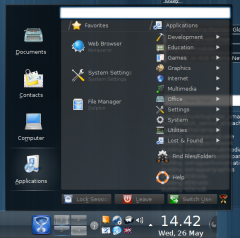 |
Lancelot за типових налаштувань |
Після натискання доданої вами на панель піктограми запуску буде відкрито меню Lancelot.
У цьому меню ви побачите чотири розділи: , , і .
Розділи
Програми
У розділі Програми ви побачите у лівому стовпчику список ваших улюблених програм, а у правому — список категорій програм. Якщо пункту потрібної вам програми немає у списку улюблених програм, ви можете переглянути вміст категорій з правого стовпчика (достатньо лише вибрати відповідну категорію).
Після входу до однієї з категорій розділ «Улюблені» зникне, щоб надати вам більше місця для перегляду. Повернутися до початкового стану завжди можна за допомогою панелі послідовної навігації, розташованої у верхній частині меню.
Комп’ютер
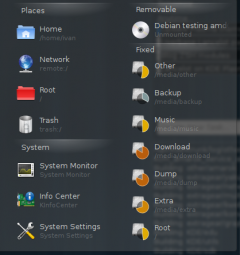 |
Розділ «Комп’ютер» у меню Lancelot |
У розділі Комп’ютер міститься список вказаних місць у файловій системі (список буде запозичено з Dolphin), пункти деяких корисних програм для роботи з системою та список пристроїв зберігання даних.
Ви зможете виштовхнути носій, змонтувати або демонтувати пристрій безпосередньо з меню. Достатньо лише клацнути правою кнопкою на пункті бажаного пристрою і вибрати відповідний пункт дії з контекстного меню.
Контакти
У розділі Контакти буде показано список непрочитаних повідомлень на основі даних Akonadi (KMail) та пункти контактів, які перебувають у мережі, на основі даних Kopete.
Документи
The Documents section shows a list of office applications on the left, and a list of currently and recently opened documents on the right.
Searching capabilities
Lancelot provides all searching features KRunner has. You can use it to find applications, to do calculations, execute BASH commands, as a unit converter etc. For more details, see KRunner Usage.
If you don't like to use the mouse, every part of Lancelot can be accessed via keyboard.
| Action | Key | Description |
|---|---|---|
| Switch sections one by one | Page Up and Page Down | Shows previous and next section respectively |
| Switch to the specific section | Alt + number | Alt + 1 for Applications, Alt + 2 for Computer... |
| Activating items | Alt + letter | If an item has a letter underlined in its title, it can be activated by pressing together Alt and that letter |
| Moving through list items | Up and Down keys | |
| Moving between columns | Left and Right keys | |
| Activating the selected item | Enter | If no item is selected, the first search result is executed |
| Opening context menu for the selected item | Alt + Enter | |
| Search box completion | Tab and End; Left and Right keys | Tab and End keys use the whole suggestion while Left and Right move through the suggestion. |
More advanced topics
Advanced UI concepts
No-click activation
In order to reduce repetitive strain injuries produced by clicking the mouse buttons, Lancelot can be operated, if desired, without a single click.
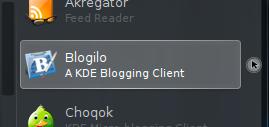
When you hover an item in the menu, a small icon that looks like a target with a mouse cursor drawn in it will appear. Instead of clicking, you can just hover the icon (or the area near it) and the item will be automatically activated.
Adaptive layout
The layout of the menu differs depending on the position of the applet which invoked it.
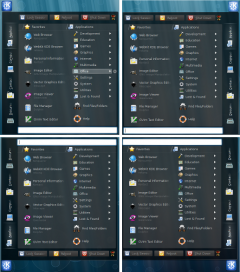
Always, the closest to the invoking applet (and the mouse cursor) are the section and system buttons, and the search box is on the opposite side since it has the focus by default and you don't need to click it in order to use it.
The sections are also reordered so that the Applications section is the closest to the mouse cursor.
Adaptive item sizes
The less items a list has, the larger the items and bigger the area for clicking.
When there are more items, Lancelot tries to show them all at once by reducing the size. If there are too many items to be shown all at once, the scrollbars are used as a solution.
Show sections inside the applet
If you think that the section buttons are too big and would be better if placed inside the panel itself, just right-click the applet, choose and .
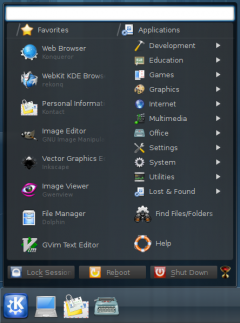
Show smaller section buttons
If you think that the section buttons are too big, but you don't want to place them inside the panel, just right-click them and choose .
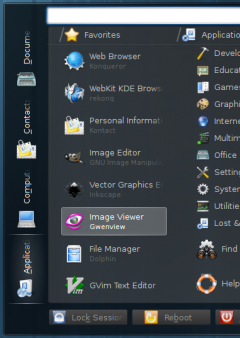
Custom system actions
If you don't use session switching (the 'switch user' feature), you can set different actions to the buttons in the bottom part of the window via the tab of the Lancelot's configuration dialogue.
Custom applications
You can choose which applications to show in the Documents and System sections via the tab of the Lancelot configuration dialogue.
Reordering items
You can change the order of favourite applications just by drag and drop. Mind that for it to work, you need to unlock your desktop first.
Some users prefer that the applications subcategories open in separate popups like they are used to from the classic menu from KDE 3. Since KDE SC 4.5, a new experimental feature was added to Lancelot which enables this behaviour.
To enable it, check the option in the tab of Lancelot's configuration dialogue.
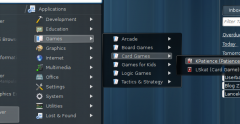
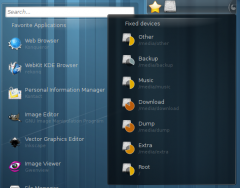
It is useful to have things that you use often placed on the desktop or the panel. For more info, see using the Shelf applet
